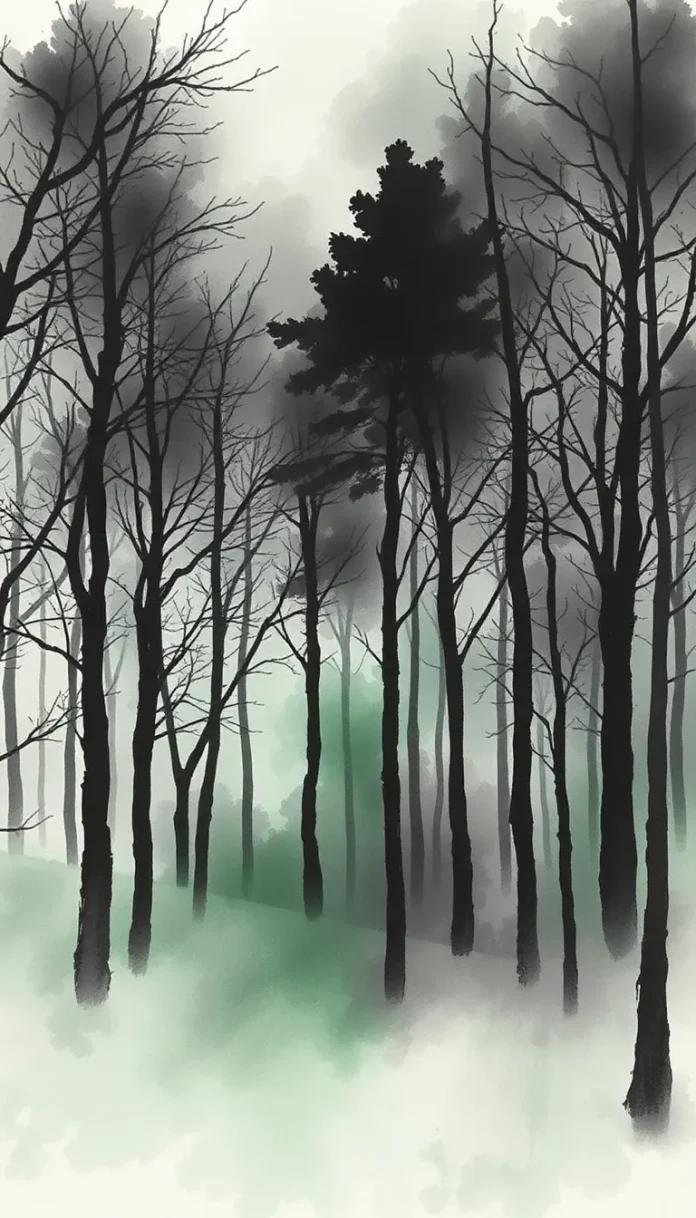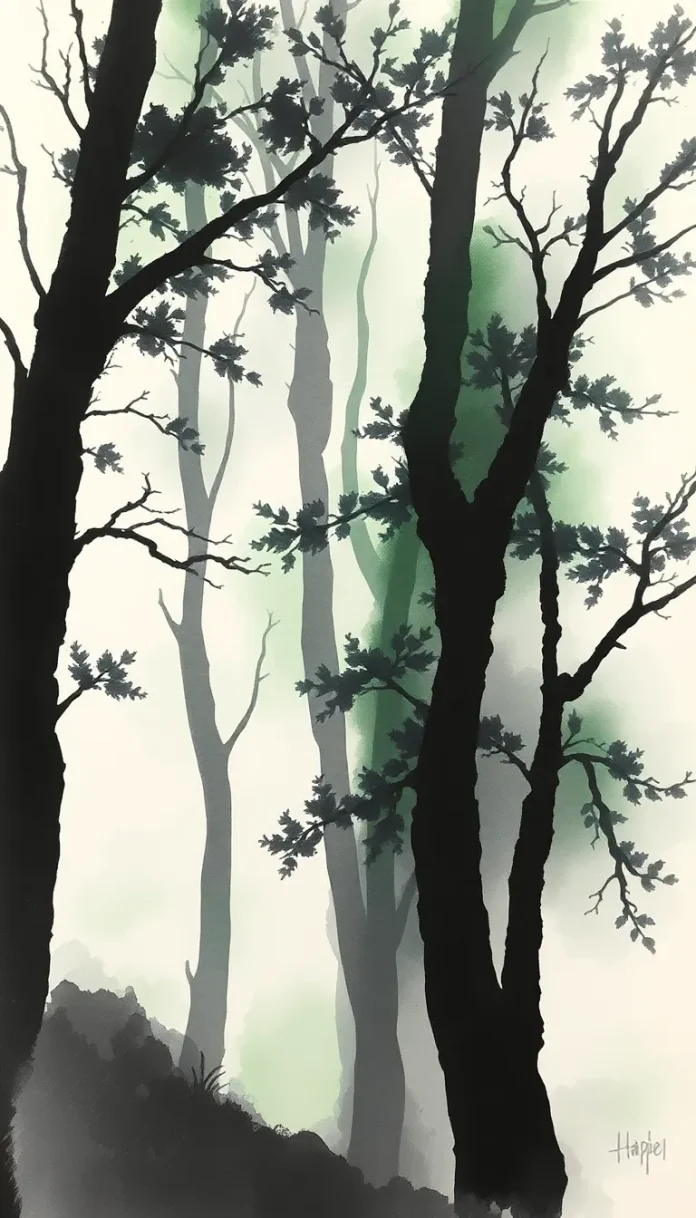The Lament of the Wandering Mariner
amidst the endless ocean of memory—a sailor adrift,
whose weathered eyes reflect the mournful hues of a bygone era.
He treads upon the crests of indomitable waves,
an outcast harbouring within him the weight of yesteryears,
seeking redemption in the echo of lost dreams.
He speaks to the wind in sonorous whispers:
“Guide me, O ethereal tide, towards what once was,
for I have sailed in search of a forgotten shore
where the soul might reclaim its vanished past.”
Thus begins the inner voyage of a mariner forsaken,
explorer of a heart-landscape wrought with agony and hope entwined.
Far beyond the realm of mortal sight,
amidst a danse macabre of cascading mists,
an ancient castle emerges—its silhouette, a specter
of once-resplendent glory now surrendered to decay.
Gothic spires, like arms outstretched in lament,
beckon the traveler into their labyrinth of confidences,
whispering secrets through the rustling ivy and shattered stone.
He approaches this abandoned keep, a relic ensnared
by time’s relentless grasp, and his footsteps resonate
with the cadence of a sorrowful dirge along the cobblestone path.
Each echo in the vacant corridors stokes
the inner furnace of longing, a yearning to touch
the immaculate past that remains ever elusive.
Within these ruined walls, memories stir as ghosts,
fragile apparitions that haunt the threshold of his soul.
Inside the castle’s heart, beneath a vaulted sky of crumbling stone,
the mariner embarks on an odyssey of introspection.
The corridors of the mind twist and meander
like the labyrinthine passages of the ancient edifice,
each chamber a repository of echoes—of laughter, tears,
of moments once luminous now dimmed by the relentless ravages of time.
“I wander not only these halls,
but the depths of my own lost spirit,” he murmurs
to the silent audience of cascading dust,
finding company in the solitude of reflection.
His footsteps awaken images of a once vibrant past
where hopes soared as high as the castle’s once-proud towers,
where love and valor wove the tapestry of a life that now is but a memory.
In a candlelit chamber, where solitude becomes a shimmering mirage,
the mariner discovers a grand mirror, veined with the passage of years,
its surface a portal into realms of bittersweet recollection.
He gazes into the shimmering glass, and in its depths, he perceives
the visage of his long-lost self—a man radiant with innocence
and unburdened by regret, whose eyes sparkled with the fire of youthful ambition.
But as the mirror quivers, the reflection dissolves into phantom hues,
leaving only the mournful spectre of the present behind.
A dialogue commences between heart and memory,
each word a tender lament, each pause a chasm of despair:
“Tell me, O forgotten self,
is the love that once guided thee now lost in the interstices of time?”
The echo answers in dulcet, haunting cadence,
“Return, noble soul, to that vanished shore
where dreams may dance with the light of innocence,
but know that the journey back is paved with bittersweet despair.”
Thus the mariner, ensnared in the reverie of impossibility,
clutches at spectral fragments of a yesteryear never to be reclaimed.
Drifting further into the maze of the castle’s interior,
every stone and crevice seems infused with the lament
of bygone choirs, their voices rising like a melancholic sonnet
against the desolation of abandoned grandeur.
The spires and archways murmur of battles fought in distant memory,
of love and loss intertwined, of the eternal struggle
between hope and the inexorable tide of fate.
Each relic of grandeur, each shattered mosaic,
is a testament to the transience of life, a tribute to dreams now past.
Outside, the sea continues its ceaseless murmuring,
a hymn to the immortal sorrow of existence.
The mariner, drawn inexorably toward the beckoning waters,
abandons the crumbling embrace of stone and shadow
with hesitance—a final dialogue with destiny unfolding
beneath the twilight, where sea and sky merge in silent symphony.
Yet, in his heart, the desire to turn back the relentless clock
remains an ache too profound to be silenced.
Upon the deck of his solitary vessel,
the mariner stands against the tempestuous wind,
his gaze cast over the rippling expanse of dreams deferred.
He calls out to the swirling mists:
“Where lies the portal to a time unburdened by regret?
Where shall I find that lost harbor of innocence
to anchor the soul that drifts, forever unmoored?”
But the answer comes not as a gentle breeze,
but as the relentless roar of truth:
The past is forever beyond our grasp,
a star-age memory fading in the dawning light.
In a final act of yearning, he steers his fragile barque
toward the horizon where the scarlet sun kisses the abyss,
hoping to find solace in the merging of night and day.
Yet, as the vessel crests another wavelike sorrow,
the heavens themselves conspire in mournful harmony,
casting shadows on a truth too inevitable:
That some journeys, wrought in the heart’s labyrinth,
are destined to traverse realms from which there is no return.
Within the ephemeral dance of sea and storm,
the mariner recalls the lost hours of laughter and love,
each moment a shimmering droplet in the ocean of memory.
A vision stirs—a reflection of tender days
when the castle of his mind was not yet fortified
by the siege of loss and the ravages of time.
Alas, that innocuous grace has withered
like the petals of a rose cast aside by fickle fate,
leaving only the scent of regret to linger in the air.
Echoing through the vast emptiness, a spectral voice intones:
“All that is lost can never be reclaimed;
the voyage you seek is but a dream
that dissolves into the mists of tomorrow.”
Its words fall upon the mariner’s heart like a requiem,
each syllable a piercing requital to the soul’s silent agony,
and in that moment, he understands with a dawning despair
that the journey inward is both revelation and lamentation.
Within the castle’s ancient corridors, where time stands still
and the very air shudders with the weight of history,
the mariner’s inner world cleaves to a tragic inevitability:
The past, a spectral mirage, lies forever beyond reach.
The noble heart, though fervent in its desire to return,
must face the cruel verity of existence—that every memory,
each glimmer of forgotten hope, is but a transient note
in the endless elegy of the human soul.
Thus, as the dying embers of daylight yield to the tyranny of night,
the ship, like a fragile dream, is swallowed by the melancholy sea.
The mariner, suspended in the liminal realm between longing and loss,
weaves his final soliloquy to the infinite abyss:
“I have sailed into the heart of memory,
only to confront the immutable truth:
The passage of time is a river whose current bears us
away from whence we came, never to return.”
And with this lament, his voice fades into the spectral symphony
of lapping waves and whispering winds—a requiem for what cannot be.
In the solitude of the forsaken castle, remnants of life now silently decay,
bearing witness to the tragic voyage of a soul unbound by earthly confines.
The mariner’s journey, though filled with moments of transcendent epiphany,
is marked by the inexorable cruelty of time—an inescapable fate
where the yearning for a return to a purer past meets the starkness
of an irrevocable present.
He stands alone, a silhouette against an expansive horizon of grief,
his heart imbued with the aching beauty of dreams unattained,
a testament to the immutable truth that some voyages,
once embarked upon, grant no solace at their end.
Now, in the final cadence of his solitary odyssey,
the mariner faces the ultimate reckoning—a fate sealed by the immutable laws of time:
The return to what once was lies forever beyond mortal reach.
He is embraced by the melancholy tide, his figure merging with the spectral sea,
and the abandoned castle, a silent witness to his inner pilgrimage,
echoes with the sound of an eternal lament.
Each stone, each whisper of wind through crumbling arches,
reminds us that the human spirit, though grand and resolute,
is perpetually adrift in a sea of fading memories—
seeking a harbor that exists only in the realms of the unattainable.
In this final moment of inexorable surrender,
the boundaries between dream and memory, past and present,
dissolve into a single, haunting refrain.
For the mariner, his inner voyage complete,
is transformed into a part of the eternal elegy—a somber hymn
that speaks of love and loss, hope and despair,
of a life once cherished now irretrievably lost.
And so, beneath the pale luminescence of a waning moon,
the tragic journey of the wandering soul finds its poignant close,
a melancholic reminder to all who dare to dream
that the quest for a forgotten past is as elusive
as the ephemeral dance of light upon a restless sea.


